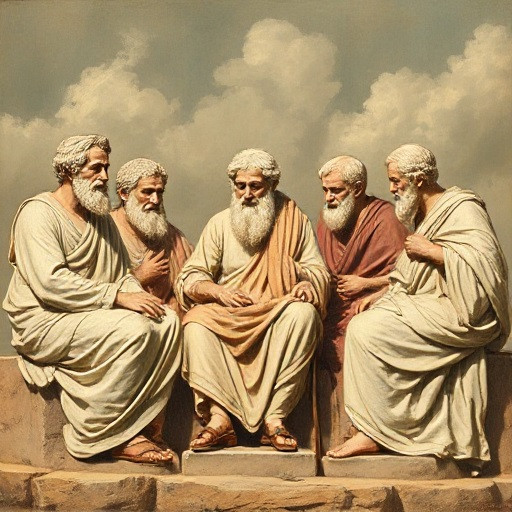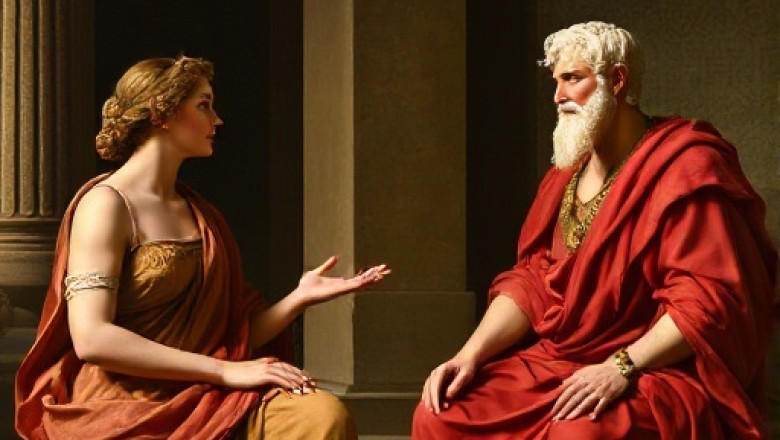Every field has its luminaries: Pythagoras shines in mathematics, Einstein and Newton are giants in physics, and in philosophy, Aristotle stands tall. Regarded as one of the most significant philosophers in history, Aristotle's philosophical impact ranks only behind his mentor, Plato. His original contributions were groundbreaking, serving as the bedrock of Western Scholasticism. Aristotle's ideas not only shaped the course of philosophy as a discipline but extended to varied fields, including biology. His ethical theories laid the groundwork for virtue ethics, a moral framework that prioritizes character in ethical considerations.
Aristotle posited a crucial distinction between being a good person and being a good citizen. In his "Nicomachean Ethics," he famously states, "It is not always the same thing to be a good man and a good citizen," a notion that transformed political thought.
Throughout his life, Aristotle interacted with numerous influential figures, including the eventual world-conqueror, Alexander the Great, whom he tutored in his later years. Explore Aristotle's life and some of his most pivotal philosophical contributions.
Early Life and Education
Born in 384 BC in the small Greek town of Stagira, Aristotle's name translates to "the best purpose," a testament to his substantial philosophical contributions. Details of his early years are sparse, but it is known that he spent considerable time in the Macedonian palace due to his family's close ties with the monarchy—his father was the king's physician.
Inspired by his father's scientific endeavors, Aristotle embraced his education enthusiastically. At age 17, he joined Plato's Academy in Athens, where he would remain for two decades. Although some of Aristotle's writings from this period survived, they remain limited. Initially, his style echoed Plato's dialogue-centric approach, as exemplified in works like "Eudemus." However, Aristotle's views diverged significantly; he believed that the soul is imprisoned in the body, and true happiness is only achieved once the individual transcends physical existence.
Departure from AthensThe precise reasons for Aristotle's departure from Athens remain uncertain. Traditional narratives suggest he expressed discontent with the Academy's new direction under Plato's nephew, Speusippus. However, there are claims that he left earlier due to rising anti-Macedonian sentiments and sought refuge with his friend Hermias of Atarneus in Asia Minor. During this time, he conducted extensive biological studies on the island of Lesbos alongside Theophrastus.
Distancing from PlatoThough deeply influenced by Plato, Aristotle’s philosophies were marked by significant differences. One notable divergence concerned their views on Forms. Plato theorized that ideal Forms exist separately from the actual objects, creating an abstract level of reality to guide our understanding of concepts like friendship and justice. In contrast, Aristotle critiqued this theory for being overly abstract and insisted that the essence of an object is found in its material form, rooted firmly in reality.
Aristotle's WorksAristotle is credited with authoring around 200 works, of which only 31 have survived. His writings can be categorized into four main areas:
- Organon: Focused on logic and philosophy.
- Theoretical Works: Addressing diverse topics, including zoology, cosmology, and physics.
- Ethics and Politics: Examining moral philosophy and civic life.
- Rhetoric and Poetics: Exploring arts and human creativity, with "Poetics" divided into discussions on tragedy and comedy.
A pivotal concept in Aristotle's philosophy is Substance Theory, asserting that substances—composed of both matter and form—constitute the universe. For Aristotle, matter pertains to the physicality of an object, while form encompasses its essential traits. This theory also differentiated between essential and accidental properties, aiding in understanding the nature of both tangible (like trees) and abstract substances (like justice).
EthicsIn "Nicomachean Ethics," Aristotle articulates his ethical philosophy, which inspired the development of Aristotelian ethics. He primarily seeks to answer two questions: What constitutes a good life? What virtues enable an individual to thrive?
For Aristotle, the ultimate goal of human life is happiness, defined not by external achievements or possessions but through alignment of the soul with virtue. He identifies four cardinal virtues: wisdom, courage, justice, and self-control.
A notable concept introduced by Aristotle is the Golden Mean, suggesting that virtue lies between excess and deficiency in behavior. For instance, genuine courage involves striking the right balance between reckless bravery and cowardice. He also introduced the idea of eudaimonia, signifying human flourishing, achievable through virtuous living.
Logic and KnowledgeAristotle’s logical works, collectively known as Organon, encompass significant texts like "Categories" and "Prior Analytics." His contributions to logic and reasoning were foundational, with Immanuel Kant remarking that Aristotle discovered everything conceivable about logic at his time. However, modern advancements have expanded upon his insights.
Aristotle’s epistemology leaned towards empiricism, asserting that knowledge is gained through sensory experience and observation. He emphasized deduction and inferences, which later evolved into the concept of syllogism in modern philosophical thought.
PoliticsIn "Politics," Aristotle explored the nature of human community and posited that cities are natural constructs, evidencing that humans are inherently political beings. His ethical and political philosophies interconnect, particularly in his assertion that being a good citizen is distinct from being a good person. For Aristotle, the roles of citizenry can vary based on the societal context, suggesting the potential necessity of acting against personal ethics for the sake of civic duties.
Contributions to ScienceAristotle made notable contributions to the sciences, particularly biology. While he may not meet today's scientific standards, his systematic studies of various life forms laid the groundwork for biological classification. He categorized animals primarily based on blood—defining vertebrates as those with red blood and classifying bloodless creatures separately. His anatomical studies, although outdated now, were revolutionary in their time.
Relationship with Alexander the GreatIn 343 BC, Philip II of Macedon appointed Aristotle as the tutor for his son Alexander. Relocating from Lesbos to Pella, Aristotle began instructing the teenage Alexander. While specific details about the content of their lessons are scant, certain texts previously attributed to Aristotle have been deemed forgeries. Their tutelage lasted only a few years, ending when Alexander took on military responsibilities under his father. Nonetheless, during his conquests, Alexander reportedly maintained some correspondence with Aristotle, sharing samples for scientific analysis.
After Alexander's death in 323 BC, anti-Macedonian sentiment surged in Athens, prompting Aristotle to flee to Chalcis, where he passed away the following year.
The LyceumAristotle established his own school, the Lyceum, which was situated in a gymnasium while Alexander expanded his empire. The Lyceum boasted a library and a dedicated group of researchers. Unlike Plato's Academy, Aristotle's lectures were more accessible to the public.
This institution marked a significant advancement in philosophical education, fostering a culture of reading and critical inquiry. The Lyceum amassed a substantial collection of manuscripts, representing one of the earliest great libraries. Though the school's precise duration post-Aristotle's death remains uncertain, it continued to influence philosophical thought for some time.
Twelve Philosophical Concepts You Should KnowPhilosophy, deriving its name from the ancient Greek words meaning "love of wisdom," spans from Plato and Aristotle to Kant and Descartes, relentlessly probing fundamental issues regarding existence, knowledge, values, and language.
Aristotle's LegacyAristotle's teachings profoundly influenced his students, many of whom integrated his principles with their own ideas. Notably, Thomas Aquinas blended Aristotelian philosophy with Christian doctrines, establishing it as the foundation of Christian philosophy from the 12th to the 16th century.
Today, Aristotle remains a cornerstone of philosophical thought, with contemporary philosophers continually drawing insights from his extensive body of work. His legacy endures as a vital piece of the foundation of Western philosophy, echoing across centuries and continuing to inspire modern discourse.
All Images generated by AI

